- Home
- Gail Godwin
The Finishing School Page 18
The Finishing School Read online
Page 18
Then we climbed the steep path to the tower and looked down on the surrounding valleys. She pointed out the Cristianas’ shiny roof, and the dark wedge of pines (“The pond is in there, and our ‘Finishing School’ ”), and the clump of trees that hid what she called “our house,” as if it were my house, too, and I lived in it with them.
And then, going down, I played that strange little game with myself, decreeing that if I let her out of sight on the path, I would lose her forever. She was walking ahead of me. I stood still and let her disappear.
And afterward, when I cried, and she comforted me, and then that old couple passed us, wearing their funny, baggy walking shorts and matching brown shoes with tassels that flapped. And Ursula said, “They thought we were mother and daughter.… It was a nice feeling, having them think you belonged to me.”
The sun flashed on the spinning mountains. We had drunk red wine with lunch, and I went into a kind of swoon. “I do belong to you,” I said, nestling close to her. “Oh, child, child,” she murmured, resting her chin on the top of my head.
The outline of the tower is particularly sharp today in the harsh spring light. I know for a fact that the old hotel is still flourishing. Recently I saw pictures and a big write-up about it in a magazine while I was waiting in my ophthalmologist’s office. It has become a favorite retreat, the article said, for nostalgic weekenders harassed by the cruel tempo of modern life. Its Victorian-Gothic atmosphere is soothing, suggestive. The Mystery Writers of America, the article said, now hold their annual conventions there.
I turned my back on the mountains and the tower and left the ruined terrace. I climbed the discolored, grassy hill and got back in my rented car and drove back to the haywagon road, where, resolved to follow through in full the requirements of this scene, I pulled off on the shoulder of Old Clove Road, locked the car and took my purse, and—under the accusing glance of the fat woman on the trailer steps and the curious stares of her brood of children—boldly lifted my skirt and stepped over the chain with its No Trespassing sign. Slinging my purse jauntily over my shoulder, I walked down the haywagon road with the assurance of an absentee landlady come to inspect her property. The Cristianas’ name was on the No Trespassing sign, and if any or all of them should suddenly materialize and block my path, I would simply say, “Remember me? Justin Stokes? Well, you see, I’ve been haunted quite a bit over the years, as I’m sure you must have been, and so I decided to come back and see if I could lay some ghosts … if you’ll excuse the unfortunate pun.” I was angry as I walked down the haywagon road, angry at the Cristianas for prospering, angry at myself for prospering, angry at all the changes I saw around me, from the fat woman and her trailer to the blight that had struck many of the remaining pines, causing them to turn brown. As I entered the pine forest, or what was left of it, I became even angrier when I realized that, once again, I was hearing music. But this time it was not Bach; it was nasal country and western, following me from the direction of the trailer.
The pond was still there, but smaller and full of woodland debris. I could not imagine Ursula, even at her boldest, swimming in it now.
The hut was a heap of stones. But there lay the oblong slab that had once been the doorstoop, the threshold—as if it had preserved itself as the one necessary piece of scenery for this act—and I picked my way through the rubble and sat down on it, first casting a wary glance all around, though I knew it was still too cold for snakes. Who owned the pond now? If it was still “DeVane” land, then it had been sold to the department store executive and was now in the hands of Century 21. I remembered how, that sunny spring day when I had gone horseback riding with Ed and his sister Ann, he had told me that his father had wanted to buy the hut and the pond and stock the pond with fish. But Ursula had needed the pond as a retreat, and Mr. Cristiana had told his children that she was a brave woman and was entitled to the few pleasures she had left.
I could see why, even if the Cristianas now owned the pond, they would be glad to see it fill up with silt and natural debris. Let one more generation grow up, perhaps; let the older generation of gossips die; and then rebuild. A playhouse, a guest cottage. Dredge the pond and let fresh water fill up again. Or fill it in and level the whole dying forest and make a profitable little “estate” of half-acre lots—maybe even a trailer park. Plenty of useful things can be built on the ruins of other people’s lives. Look how I have profited from Ursula’s influence; look how I have been profiting lately, in spirit and energy, from the memories and dreams she inhabits.
“For you, Justin, I’m convinced nothing but a life of art will do,” she told me down here one afternoon, as we sat hip-to-hip on this crumbly slab of stone. Often she would have been in for a swim, sporting around in the pond while I watched her, teasing me for my cowardice, telling me how refreshing the water felt. Afterward, she would dress in the hut and then come out and sit beside me, toweling her curly hair, or rubbing it briskly with her fingertips when she forgot the towel. I loved the way she told stories about her life. As I watched her face, it was as if I saw the stories happening. I would think about them between visits. I would imagine them from her side, pretending I was she. I had bought a bottle of the lotion I had seen on her dresser and I would rub it on my body before I went to bed at night. I would turn off the light in my room at Lucas Meadows and “become” Ursula DeVane, lying in her independent white room in the house on Old Clove Road. I would pretend I was Ursula remembering her past. Remembering her young lover in France, how they had climbed up the precipitous ledge to the ancestors’ stronghold and lain down in the moonlit ruins of the Chäteau DeVeine and whispered that they had been united already in past incarnations. And sometimes I would imagine everything so well that I would feel strange stirrings and almost cease to be myself.
I also loved it when she talked about me. She created me as she talked. She examined the substance of me and then prophesied, in grand, sweeping strokes, the uses to which I could be put. “For some people, a life in art is the only way they can survive,” she had said. “I know what I’m talking about. I knew, I knew that Sunday tea when you described your room to Julie and me that you could not bear the ordinary life. Your soul craves that constant heightening of reality only art can give. So does mine. So does Julie’s. Oh, you’re one of us, all right. We need our definite, dramatic shapes. I’m not sure what your art will be yet. Are you? Well, never mind. You’ve got lots of time. Even the times are on your side. There’s no depression, as there was when Julie and I were growing up and Father didn’t even have the money to send him to Juilliard. I don’t know what would have become of Julie’s talent if he hadn’t won that scholarship. As for me, I was my own college. I knew Father needed me, and after that, I was going to be an actress. Actresses don’t need college. But your mother has put away money for your college, and you must go and soak up every opportunity, keep that absorbing mind of yours busy until your chosen art makes itself clear. Meanwhile, during your sojourn in the provinces with us”—and she laughed in her arch, throaty way—“it will be my pleasure, mademoiselle, to teach you what I can at our little Finishing School here among the pines.”
I looked across the pond and saw a dirty little boy watching me from behind a tree. He was about four, or maybe five, or even six. It’s hard for me to tell the ages of young children, never having had any of my own. I recognized him as one of the trailer children and said hello. He didn’t answer, but continued to watch me with his flat brown disks of eyes. The lids were curiously shaped, almost Oriental. I must have been an odd vision to him: a woman in “city clothes” sitting all by herself among a heap of stones in the woods, her purse beside her.
“Do you ever swim in this pond?” I asked, projecting what I hoped would come across as a cheerful, matey image: for some reason, it was important to me that he think me normal. “I knew a woman who used to swim here.”
He narrowed his eyes at me across the pond. I could see from his expression that I was becoming more inauthentic t
o him by the second. Then he filled his lungs—I could see his ribs rise beneath his soiled T-shirt like a pair of small bellows—and shouted, “No she didn’t! They’s snapping turtles in there. They’d kill her to pieces.” And he ran away as fast as he could through the pines, back to the safety of his trailer home.
When I returned to the car, there was nobody outside the trailer. Had the mother herded them all inside to watch the crazy woman from behind a curtain? Perhaps the mother was telephoning the Cristianas right now. “Sir, I don’t like to bother you, but there’s this strange woman down by your pond.…”
It was not yet two in the afternoon when I left Old Clove Road. I could be on the thruway in fifteen minutes, back in the city by four-thirty, beating the rush hour. Then a hot bath, soaking and meditating on this journey, and supper and a glass of wine. The rest of the evening I would work some more on Lady Macbeth. “Come, you spirits that tend on mortal thoughts, unsex me here …” On that soliloquy hangs so much: I become Macbeth’s Evil Genius, but I remain also a woman determined to help her husband. If that dual nature of the role is not preserved, something brilliant is lost.
But when I was almost to the thruway in Kingston, hunger overcame me and I stopped for a hamburger at Howard Johnson’s. What I did next is hard to explain. I think I did it partly because of that inveterate desire to stir life up when it has not, of its own initiative, met my needs for drama; but also because I had not found the one I wanted to find, and her absence in spirit from her old homestead provoked me into seeking out a long-avoided source.
I called Mott. I went to the pay phone in Howard Johnson’s and looked up “IBM Corp Neighbrhd Rd” and dialed the number and asked for Eric Mott. I knew from Becky that he was still there. Steady old Mott. In a corporation whose employees have made its name an acronym for “I’ve Been Moved,” steady Mott has managed to stay put at one location for twenty-eight years.
He was on the phone before I was ready for him. What have I done? I thought, panicking. But I had given my name to the secretary and it was too late. He was so pleased. He had not heard from me in years: he had thought I had forgotten him, he said. He had meant, he had really meant, to get down to New York to see me in that last play—Becky had told him about it—but, what with one thing and another, he hadn’t been down to New York City in almost five years. Where was I calling from? Kingston! Howard Johnson’s?
“Why, you’re only minutes away,” he said, and proceeded to give painstaking directions, directions even a child could follow, to Neighborhood Road. After he had finished, he made me repeat them back to him.
And so I got back in the rented car and drove, of my own instigation, to meet a person who had bored me as a child; a person whose face I could never remember, even when I saw it several times a week; a person I had never really liked because I sensed—rightly—that he might one day try to “help out” more than you wanted him to. I drove to meet the man whose dutiful protectiveness of me had combined so lethally that long-ago August evening with my obstinate pursuit of Ursula DeVane’s attentions.
Neighborhood Road looked like a movie set, though whether for a euphemistic documentary about a friendly corporation or a surrealist’s sinister satire on corporate life it was hard to say. I tended to the latter impression as I drove slowly down the neat, straight road (lanes carefully marked for left turns) with smooth grounds and modern office buildings on both sides. I made a left turn into the parking lot beside the big white building with the American flag in front (Mott’s headquarters), and a mechanical arm swung up to admit my car after I had pressed a button. A sign directly above the button informed me that the only way I could get out of the parking lot was by depositing a special “gold coin” (available only from the receptionist at the main desk) into the slot at the exit gate. Employees with earnest, abstracted faces walked briskly from one building to another, tiny replicas of these faces flapping with the identification tags on their lapels. After I had identified myself to the stylish middle-aged receptionist at the main desk, and had explained my purpose, and she had confirmed this by a phone call to Mott’s secretary, I was given a visitor’s badge, with a picture of the building I was now in, but with azaleas blooming all around it. The receptionist, who looked as if she had just come from the hairdresser, wrote out my name in an even, legible hand, and watched me while I pinned it on my sweater. I could tell she was having trouble “placing” me, and I tried to soothe her cautious imagination by chatting briefly about the weather. I was glad I had worn a skirt for this outing. By the time she had issued me my “gold coin” for getting out of the parking lot later, the atmosphere of the place had begun to make me feel like an outlaw disguised as a kind niece, come by to pay dutiful respects to an old uncle at his place of work. I sat down next to a window behind which two uniformed guards kept surveillance over a bank of closed-circuit monitors. On the monitors, you could watch the movements of employees a they went from room to room in the inner recesses of this building. While waiting for Mott, I followed the progress of a stoop-shouldered man with dark hair and a small mustache. Down one hall he went, coattails flopping behind him on the black-and-white monitor. Then through a door and down another hall. He reminded me a little of Charlie Chaplin. Then the door to the reception room opened and there stood the same man in living color. He stared at me, trying to decide something.
“Justin, honey?”
“Good God, Mott, it’s you!” I blurted. When had he grown that ludicrous mustache? Surely he had never had such black hair. He must dye it. He looked completely changed in externals from the old Mott, with his colorless crew cut and forgettable face. And yet the face was his, I now saw. It was just that the mustache and the black hair and the dry creases down the cheeks and around the mouth gave him a definite outline he hadn’t had before. “I was watching this man on the monitor,” I said, “but I didn’t realize I was watching you until you came through the door.”
“Well,” he said, self-consciously lifting a hand to the silky black hair that I had decided must certainly be dyed, “it’s been a long time for both of us, hasn’t it?”
He proudly escorted me back through the labyrinth of doors and halls to his office. I was aware that the guards were now following my image on their screens. Such a surprise, Mott was saying, my suddenly phoning like that. What was I doing in the area, anyway? I told him I was between plays and had decided to take a sentimental journey and look at the old places. “Lucas Meadows has changed,” I said.
“Oh, it’s gone down, there’s no doubt about it,” said Mott. “No IBMer has lived there in years. The zoning laws have changed over there. A new element has moved in.”
“Yes, I noticed a lot of trailers on Old Clove Road.” I couldn’t look at him while I pronounced the name of the road. “There weren’t trailers before, were there?”
“I don’t think so,” said Mott absently, not appearing to pick up any significance in my mention of the road he had driven me, stunned and shivering, away from, on that night twenty-six years ago. “Here’s my office. This is Karen, my secretary. Karen, I’d like you to meet my niece—my ex-wife’s niece, actually, but I’m proud to claim her. She’s an actress, Justin Stokes—you may have seen her in something. I’m ashamed to say she was in a Broadway hit for over a year, and I never made it down to see her.”
“I haven’t seen a play since I was in high school,” said Karen, a young, neat, sexless person with straight white teeth. “Have you been in any movies?”
“I’ve done some work in television. Some O’Neill plays. It was a few years back.”
“No,” said Karen, shaking her head seriously, “I don’t think I … but I’m very glad to meet you.” She smiled, showing her white teeth, and then recrossed her legs chastely behind her word processor. I was sure she was the kind of girl who wore white cotton panties under her pantyhose.
We went into Mott’s inner sanctum. He motioned me to a comfortable chair and sat down at his own desk and peered at me in a shy-friendly
way over his black mustache: did he dye that, too?
“How is your mother?” he asked.
“Oh, prospering.”
“And Jem?”
“He’s prospering, too,” I said. The word seemed to be stuck in my mind today.
“I always liked that little fellow. Made me real sad when he moved away. And now he’s married. He sent me an invitation, which I appreciated. I got a nice note from the bride, thanking me for my present.” He blinked at me and looked hesitant. “You got married, too, didn’t you? But it was a while back.”
“I’m afraid it didn’t last.” Mott was referring to my first marriage, to which, I now realized, I had neglected to send him an invitation. I saw no reason to enlighten him about the second failed marriage, to “Jack Tanner”; it would just confuse him.
“That’s too bad,” said Mott gravely. “I’m sorry to hear it.”
“Oh, neither of us was damaged irreparably,” I said airily. It all seemed such a long time ago, a sort of sociable mistake made by two young people trying to honor the conventions.
Mott cast his eyes down to his clean desk. I had worried him with my flip remark. On the shelf behind his desk and stacked on the low round table beside my chair were multiple copies of two books: The Lengthening Shadow: The Life of Thomas J. Watson, and A Business and Its Beliefs: The Ideas That Helped Build IBM, by Thomas J. Watson, Jr.
“You know, Mott,” I said, trying to project an “upbeat, normal” image, “I just realized, I don’t know what your job is. I don’t think I ever knew. Or was I just too wrapped up in my adolescent traumas ever to ask?”
“If you had asked, I couldn’t have told you,” he said, with a little sparkle in his eye. “I couldn’t even tell Mona what I did. We were working on a top-secret project. As a matter of fact, I just got through giving a slide show to some of our new employees. That’s part of my job now. I’m the resident historian of this site. If you have a few minutes, I can show you what I did. I can even show you a picture of myself at work, back in those days.”

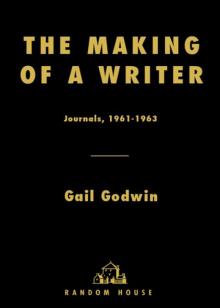 The Making of a Writer
The Making of a Writer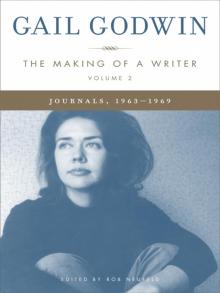 The Making of a Writer, Volume 2
The Making of a Writer, Volume 2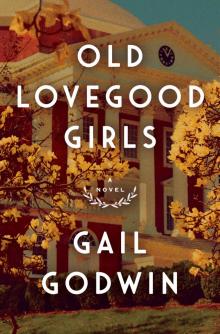 Old Lovegood Girls
Old Lovegood Girls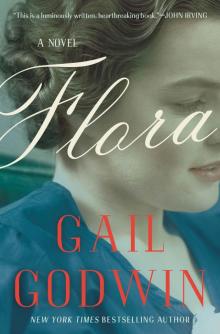 Flora
Flora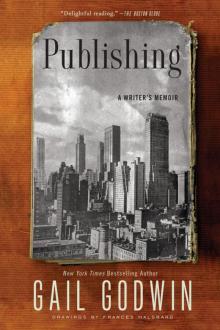 Publishing
Publishing The Finishing School
The Finishing School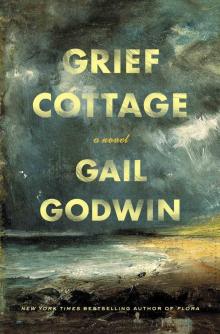 Grief Cottage
Grief Cottage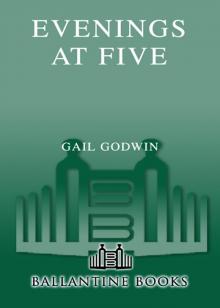 Evenings at Five
Evenings at Five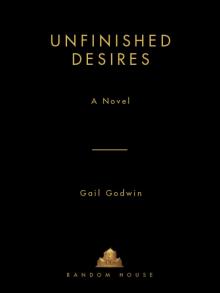 Unfinished Desires
Unfinished Desires